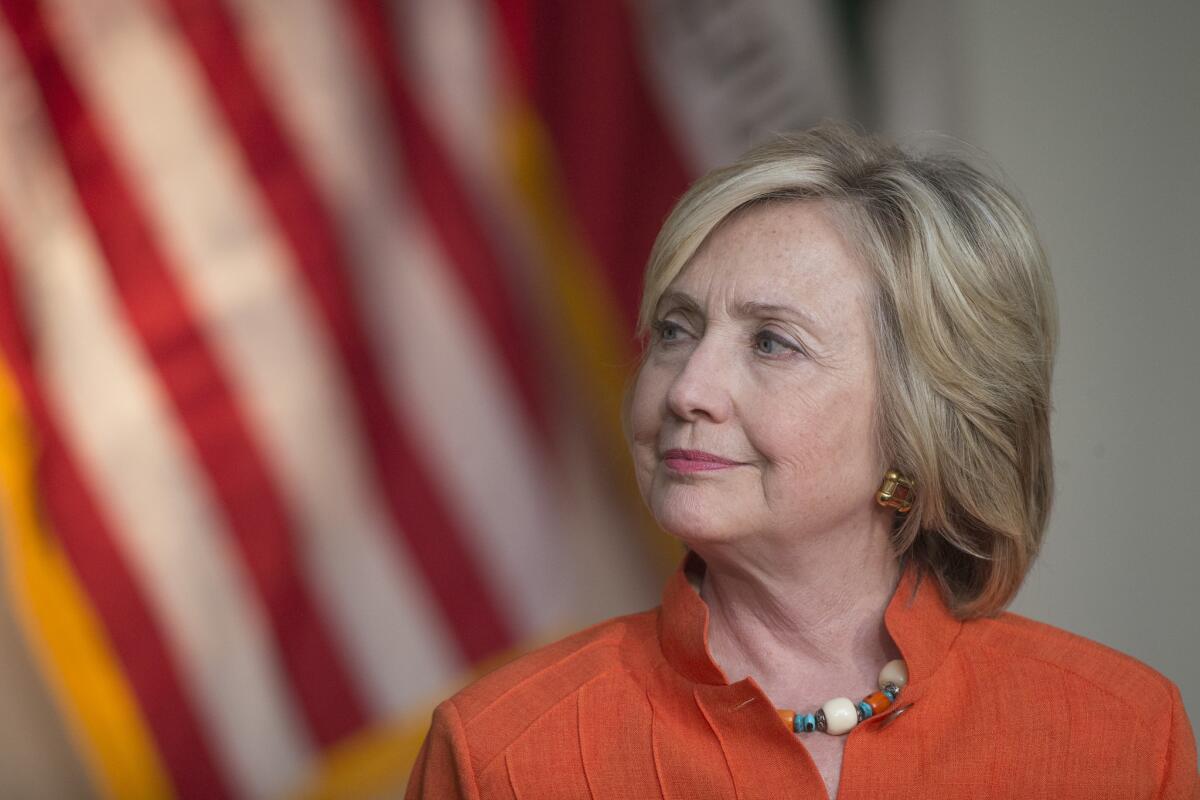New worry for tech firms that don’t want to hand data to the government: Hillary Clinton

Hillary Rodham Clinton says the government needs to examine Islamic State’s use of social media. Silicon Valley is already wary of what information lawmakers want from tech companies.
Reporting from Washington — When Hillary Rodham Clinton talks tough about diluting the influence of the sprawling Islamic State terrorist network, she sometimes skips the rhetoric on diplomatic and military strategy in the Middle East - and instead targets Silicon Valley.
Executives in the boardrooms of America’s big tech firms are taking notice as the Democratic front-runner in the presidential race warns about the impunity with which terrorists operate online. Clinton said the problem needs a “hard look” by government. Internet freedom is great, she told voters at a town hall in New Hampshire, “but I don’t believe we should give a free pass to a terrorist organization.”
The remarks haven’t been particularly controversial in the early voting states where Clinton is stumping. But across the country in the Bay Area, the social media industry is anxious about what exactly Clinton has in mind. Her focus comes as tech companies are engaged in a pitched battle with their state’s senior senator, Dianne Feinstein, over her push to require Internet companies to become government informants when they come across potentially troublesome communications.
TRAIL GUIDE: Daily tour through the wilds of the 2016 presidential campaign >>
At the core of the dispute is disagreement over how much companies should do to stop terrorist groups from using their platforms to recruit members and coordinate attacks. The firms, Feinstein said at a hearing last month, are taking down thousands of posts monthly that violate corporate bans on terrorism-related discussions – but they are not alerting law enforcement about any of that content. Feinstein made the comments after convening meetings with high-level officials at Google, Facebook, Yahoo, Twitter and Microsoft.
“The companies do not proactively monitor their sites to identify [terrorist] content, nor do they inform the FBI when they identified and remove their content,” she said. “I believe they should.” Soon after, the Senate Intelligence Committee, of which Feinstein is vice chair, tacked language onto a routine funding bill requiring the firms to share with law enforcement any such posts they come across.
Internet companies and privacy groups swiftly mobilized against it. They warn the measure would mandate that they become government snoops on vast numbers of users. The Internet Assn., a trade group that speaks for major Silicon Valley firms, advised lawmakers that the provision would trigger “massive reporting of items that are not likely to be of material concern to public safety.” Some 31 civil rights, technology and consumer groups told lawmakers in a letter Tuesday that it “risks bringing wholly innocent people under the scrutiny of the U.S. government.”
See the most-read stories this hour >>
There is also the question of how useful such information would be in stopping Islamic State attacks or plots inspired by the extremist group. After former contractor Edward Snowden revealed the National Security Agency’s broad collection of Americans’ phone records, intelligence officials said that program helped thwart a dozen plots. Critics countered that only one case was made as a direct result of it – an Anaheim taxi driver who sent money to Somalia’s Al Qaeda affiliate and was sentenced to six years in prison.
Some experts caution against any move that would drive Islamic State further underground, noting the group’s open use of Twitter has created valuable tracking data. “If every single [Islamic State] supporter disappeared from Twitter tomorrow, it would represent a staggering loss of intelligence,” said a report this year by the Brookings Project on U.S. Relations with the Islamic World.
Clinton, for her part, is treading cautiously. The Democrat, long a favorite of Silicon Valley donors, already rattled nerves in the tech world this summer with her inartful comments about the sharing economy, raising suspicion she would undermine firms like Uber. Her campaign says she has no plans for now to roll out a specific agenda for combating terrorism online.
The issue, though, continues to emerge on the campaign trail. GOP contender Carly Fiorina, the former CEO of Hewlett-Packard, said during a nationally televised candidate forum Thursday that the lack of cooperation between Internet companies and government is creating dangerous security lapses. Soon after, another Republican candidate, Sen. Lindsey Graham of South Carolina, vowed, “If I have to take down a cyber wall, I’ll take it.”
Back in Washington, Feinstein’s push stalled just before lawmakers broke for recess. “A number of Internet companies have raised very valid concerns,” said a statement from Sen. Ron Wyden, an Oregon Democrat who persuaded colleagues on the Intelligence Committee to put the proposal on hold. Wyden, who has been at the forefront of the push among a small group of lawmakers to limit the government’s bulk collection of data from telecom firms, said he was concerned that the proposal “does not specify how these companies should know what is and is not terrorist activity.”
Law enforcement officials had suggested the firms could employ technology they already use to help police locate child pornographers. But identifying terrorist threats, the firms say, is more complicated. Huge numbers of the posts being removed are coming from users who are not dangerous. They might have posted an article about Islamic State, made an inside joke misinterpreted by a censor or merely expressed an opinion about why the group is successful in its recruiting efforts.
“Detecting social media activity associated with terrorism is very different,” said Monika Bickert, head of policy management at Facebook. “It’s subjective and requires an incredible amount of context.”
Digital privacy groups say it is one thing for social media companies to remove posts that might be misinterpreted, but it is quite another for them to alert the FBI that the users involved may be terrorists.
“It becomes this weird sort of surveillance program under this slightly nicer title of ‘mandatory reporting,’” said Lee Tien, senior staff attorney at the Electronic Frontier Foundation.
Still, many in Congress say social media firms need to expand their cooperation with law enforcement. “I don’t think we can obligate Twitter to find every terrorist’s post,” said Rep. Brad Sherman (D-Sherman Oaks). “But if they do see it or we see it, it ought to come down and they should send us a copy.” He was among a group of congressmen who wrote to Twitter’s then-CEO Dick Costolo this year to warn that the company was not being aggressive enough in taking down terrorist content.
FBI Director James Comey told lawmakers last month that Islamic State is reaching out through Twitter to some 21,000 English-language followers. “It’s no longer the case that someone who is troubled needs to go find this propaganda and this motivation,” Comey said, “It buzzes in their pocket … all day long, saying: Kill, kill, kill, kill.”
Twitter declined to comment. But its defenders note the company has worked with the FBI to shut down accounts, and they point to the ongoing debate about whether doing so is beneficial.
Tien says he welcomes the debate – just maybe not when it takes the shape of sound bites from a presidential candidate. He said Clinton’s “free pass” remark was “not particularly serious or thoughtful.”
“It’s like cocktail party chatter,” he said.
Times staff writer David Lauter contributed to this report from Nashua, N.H.
ALSO:
Bernie Sanders brings his populist message to Los Angeles
Federal officials want access to encrypted emails and texts on private devices
Seeking an edge in the crowded GOP field, Carly Fiorina seizes on gender controversies
More to Read
Get the L.A. Times Politics newsletter
Deeply reported insights into legislation, politics and policy from Sacramento, Washington and beyond. In your inbox three times per week.
You may occasionally receive promotional content from the Los Angeles Times.











